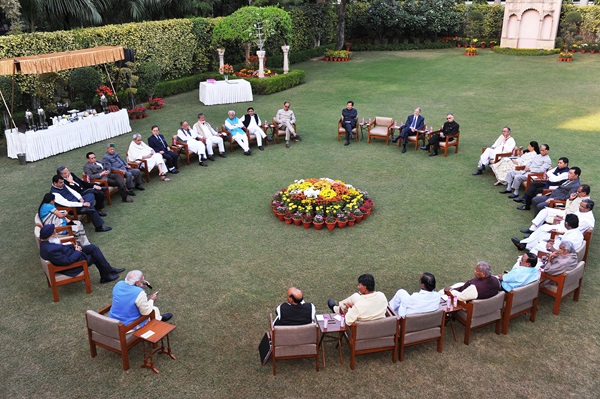.png)

Dr. Srinath Sridharan is a Corporate Advisor & Independent Director on Corporate Boards. He is the author of ‘Family and Dhanda’.
April 25, 2025 at 12:16 PM IST
India’s federal design stands at a critical juncture. For all its constitutional elegance and historical resilience, it now faces a test of practical functionality. A country of continental scale and staggering diversity cannot rely solely on uniformity or hierarchy. Its governance must rest on the principle of respectful collaboration between the Centre and the states — not as a matter of political convenience, but as a structural necessity.
The last decade offers several moments of genuine cooperative success, but it also presents equally stark reminders of fragility, delay and distrust. Collaborative federalism is not an ornamental ideal, but the operating logic of a modern republic. It must now be deepened, defended and demonstrably delivered.
One of the brightest examples of this cooperation has been the implementation of the Goods and Services Tax in 2017. The GST Council, an institutional innovation with one-third of the votes with the Centre and two-thirds with the states, has met over fifty times since 2017. It signifies a culture of deliberation and decision-making that has managed to hold despite political change and ideological divergence.
The Council’s functioning has improved economic efficiency. The deeper takeaway, however, is not about taxation. It is about trust. The GST Council works because financial incentives are aligned. The states have a stake in the system and a voice in its decisions.
But this raises a deeper philosophical and constitutional question. What happens when such financial incentives are withdrawn? Would states continue to collaborate in the same spirit on matters where no direct fiscal advantage exists? Is collaborative federalism, in its current form, more transactional than transformational? If the republic’s unity relies on economic bargains alone, we risk hollowing the constitutional soul of cooperative governance.
That fragility was exposed during the pandemic. The initial lockdown of March 2020 was imposed centrally but was operationally successful because of state-level cooperation.
However, tensions soon emerged over medical supplies, vaccine procurement, and migrant labour management. In mid-2021, vaccine distribution was decentralised, allowing states to plan procurement and deployment based on their own priorities. This adjustment, though born of necessity, was a nod to federal pragmatism.
The parallel functioning of PM-CARES at the central level and the State Disaster Response Funds at the local level reflected a layered but coordinated fiscal response. The crisis tested India’s federal machinery. It did not collapse, but it did creak. The lesson is clear. Emergency collaboration is not enough. What is needed is a permanent architecture of dialogue and shared accountability.
In healthcare, the distance between ambition and reality remains stark. Despite being a concurrent subject, where both Centre and states share responsibility, public health continues to suffer from chronic underinvestment, institutional fragmentation and uneven quality.
While national schemes like Ayushman Bharat have provided a framework for financial protection, their implementation often runs aground at the state level due to capacity gaps and administrative friction. The pandemic exposed these cracks brutally, with overstretched systems, urban-rural disparities, and inadequate coordination.
India needs a genuine federal compact in healthcare — one that aligns policy, funding and delivery across all tiers of government. Until this becomes a sustained priority rather than just a reactive measure, the promise of universal health coverage will remain aspirational.
The shoddy conditions of many public hospitals and primary health clinics across states are, quite frankly, a national failing that ought to stir both shame and urgency. Broken infrastructure, overcrowded wards, absent medical staff and supply shortages are not isolated aberrations — they are systemic and recurring. One can no longer cite population density as a justification. Scale is a given in India - governance must scale to match it.
For a country aspiring to global leadership and digital excellence, the condition of its most basic health facilities is an unacceptable contradiction. This is not merely a matter of funding, but of federal resolve and operational clarity. States must be empowered and held accountable in equal measure, and the Centre must act as enabler, not overlord. Health cannot remain an afterthought in federalism. It must become its most urgent test case.
The 14th Finance Commission further shifted the federal equation. By increasing states’ share of central taxes from 32% to 42%, it provided them with greater fiscal autonomy and planning flexibility, especially in critical sectors such as health and education. But this empowerment was undercut by a simultaneous rise in conditional central schemes such as the Jal Jeevan Mission and PM Awas Yojana.
These centrally-sponsored schemes diluted the autonomy gained through tax devolution, effectively recentralising decision-making under the guise of national priorities. Fiscal empowerment, when delivered with strings attached, becomes less about trust and more about control.
Nonetheless, there were moments of productive partnership. Infrastructure development under the PM Gati Shakti initiative is one such case. Here, Centre and states collaborated on a digital platform to fast-track the development of multi-modal logistics infrastructure. More than 100 critical infrastructure projects saw quicker clearances and implementation. It is precisely this kind of issue-based federalism — where outcomes are prioritised over turf — that must become the template for the future.
Yet, for every such success, there are missed opportunities and unsettling signals. The issue of delayed GST compensation is a cautionary tale. The Centre was constitutionally mandated to compensate states for revenue shortfalls for five years. During the pandemic year 2020–2021 alone, this shortfall was estimated at ₹2.35 trillion. The Centre eventually borrowed ₹2.69 trillion to settle part of the shortfall for 2020-21 and 2021-22.
While the effort was commendable, the delay created a trust deficit. When compensation ceased in 2022, fresh tensions surfaced. For states, the message was clear — when the Centre controls the purse strings, cooperation often comes at a cost.
The weakening of the Inter-State Council is another lost opportunity. This constitutional body was created to facilitate structured dialogue on inter-jurisdictional issues. Yet, between 2014 and 2023, it met only once. The absence of a regular, institutionalised forum deprives the federation of a space where conflict can be addressed without confrontation. When dialogue disappears, discord deepens.
Even more troubling is the growing use of central investigative agencies in opposition-ruled states. In response, at least five states, including West Bengal, Maharashtra, and Punjab, withdrew general consent for investigations by the Central Bureau of Investigation.
This is more than a political standoff. It is a symptom of institutional breakdown. A republic cannot function when its investigative agencies become instruments of perceived retribution rather than impartial enforcement.
This is the first part of a two-part series on cooperative federalism. The second part will talk about the challenges faced by federalism in India.




